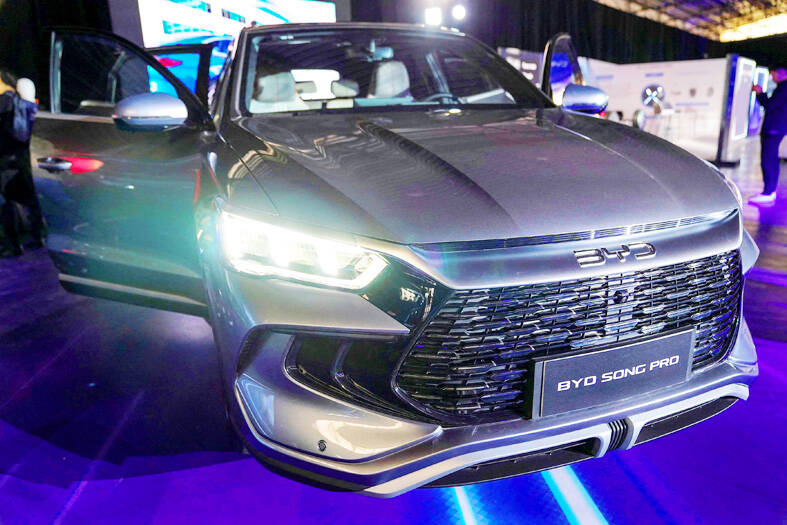Chilean truck driver Claudio Perez was dubious about his first purchase of a Chinese-made family car two years ago. However, the price and quick delivery time convinced him, and now he is a convert.
Perez, 47, is one of millions of car buyers in Latin America to have made the shift from US- and Brazilian-built cars to Chinese models over the past few years.
In 2019, the Asian economic giant sold US$2.2 billion worth of cars in the region. Last year, the figure reached US$8.5 billion, according to the UN’s International Trade Center (ITC).

Photo: Reuters
Chinese car sales represented 20 percent of the region’s total in money terms — ahead of the US with 17 percent and Brazil with 11 percent.
No other market outside Asia has a larger share of Chinese cars, according to the ITC.
“We tend to stigmatize Chinese brands, but no ... this one was super good, super good. So I don’t regret buying it,” Perez said of his first purchase, which he said he had expected to be “plastic-like.”
His next car would be Chinese too, he said.
Chinese vehicle manufacturers have redoubled their efforts in recent years to offer products at competitive prices, without compromising on quality, analysts said.
In the emerging market of electric vehicles (EV), they have taken an even bigger slice of the Latin American market, with 51 percent of all sales.
Almost all electric buses in the region are made in China.
“The growth of Chinese car manufacturers in recent years has been exponential, thanks to significant improvements in quality, technology and design,” said Andres Polverigiani of Nyvus, a consultancy firm that studies vehicle competitiveness.
In the US and Europe, both with their own automotive industries, protective import tariffs have slowed China’s advance, unlike in Latin America.
In Chile, with near-zero duties, Chinese models represented about 30 percent of car sales last year.
In Mexico and Brazil, Latin America’s biggest car producers, China is also making inroads.
Chinese giant BYD Co (比亞迪) is building its largest EV plant outside of Asia in Camacari, Brazil, with a targeted production capacity of 150,000 units every year.
In Latin America, Chinese cars, which tend to be cheaper than rivals, have enabled segments of the middle- and low-income population to buy their first vehicle, Economic Commission for Latin America and the Caribbean economist Sebastian Herreros said.
It has also allowed the introduction of cleaner engine technologies in polluted metropolises such as Santiago, Bogota and Mexico City.
“All our countries must adopt electromobility quickly, it is almost a question of survival,” Herreros said. “China is an ideal partner: It has the necessary production capacity and offers competitive prices.”

Nvidia Corp CEO Jensen Huang (黃仁勳) is expected to miss the inauguration of US president-elect Donald Trump on Monday, bucking a trend among high-profile US technology leaders. Huang is visiting East Asia this week, as he typically does around the time of the Lunar New Year, a person familiar with the situation said. He has never previously attended a US presidential inauguration, said the person, who asked not to be identified, because the plans have not been announced. That makes Nvidia an exception among the most valuable technology companies, most of which are sending cofounders or CEOs to the event. That includes

TARIFF TRADE-OFF: Machinery exports to China dropped after Beijing ended its tariff reductions in June, while potential new tariffs fueled ‘front-loaded’ orders to the US The nation’s machinery exports to the US amounted to US$7.19 billion last year, surpassing the US$6.86 billion to China to become the largest export destination for the local machinery industry, the Taiwan Association of Machinery Industry (TAMI, 台灣機械公會) said in a report on Jan. 10. It came as some manufacturers brought forward or “front-loaded” US-bound shipments as required by customers ahead of potential tariffs imposed by the new US administration, the association said. During his campaign, US president-elect Donald Trump threatened tariffs of as high as 60 percent on Chinese goods and 10 percent to 20 percent on imports from other countries.

Taiwanese manufacturers have a chance to play a key role in the humanoid robot supply chain, Tongtai Machine and Tool Co (東台精機) chairman Yen Jui-hsiung (嚴瑞雄) said yesterday. That is because Taiwanese companies are capable of making key parts needed for humanoid robots to move, such as harmonic drives and planetary gearboxes, Yen said. This ability to produce these key elements could help Taiwanese manufacturers “become part of the US supply chain,” he added. Yen made the remarks a day after Nvidia Corp cofounder and chief executive officer Jensen Huang (黃仁勳) said his company and Taiwan Semiconductor Manufacturing Co (TSMC, 台積電) are jointly

MARKET SHIFTS: Exports to the US soared more than 120 percent to almost one quarter, while ASEAN has steadily increased to 18.5 percent on rising tech sales The proportion of Taiwan’s exports directed to China, including Hong Kong, declined by more than 12 percentage points last year compared with its peak in 2020, the Ministry of Finance said on Thursday last week. The decrease reflects the ongoing restructuring of global supply chains, driven by escalating trade tensions between Beijing and Washington. Data compiled by the ministry showed China and Hong Kong accounted for 31.7 percent of Taiwan’s total outbound sales last year, a drop of 12.2 percentage points from a high of 43.9 percent in 2020. In addition to increasing trade conflicts between China and the US, the ministry said